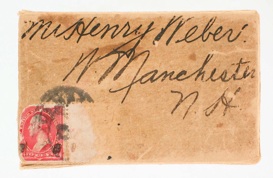Every chance he got, fourteen-year-old Henry Weber dashed down the mile-long, elm-lined Main Street in Manchester, New Hampshire, eyes glued to the ground. Saturdays were best, since farmers came early, shopped, shot the bull, then drove their teams home in time for afternoon milking and other chores. Henry wasn’t interested in chores — oh, he had them all right — he just wasn’t interested in them. Henry was focused on his treasure-hunting expeditions up one side of the 100-foot-wide street, and down the other.
There were 30,000 people living in and around town, and Henry wanted their garbage. Not all of their garbage, mind you, just the brightly colored cards and coupons casually dropped on the ground by the town’s smokers and chewers. And, in 1896, nearly every male older than fourteen — and a fair number of women —smoked or chewed. And that meant a lot of cards.
Each package of Sweet Caporal, Cameo, and Virginia Bright cigarettes was packed with cards of birds, flags or famous generals. Between-the-Acts Little Cigars offered images of athletes. There were dozens of companies and cards. But the cards Henry liked best of all were those found in each package of Hard-a-Port plug tobacco.
“Heck,” Henry reminisced in 1952, shortly before his death, “every kid I knew was looking for Hard-a-Ports ‘cause they had colored pictures of New York actresses wearin’ what we thought was nasty costumes—lots of boobie and leg showing. And, as if that wasn’t enough, if we could find a complete set, we had a deck of playing cards.”
Henry laughed as he reminisced. “How we searched for Hard-a-Ports!”
After three months of frantic scrounging, which included making friends with local saloon sweepers, Weber had only thirty-two different cards, still a long way from his goal. Then he got lucky.
“Old man McLaughlin ran the biggest cigar store in West Manchester at the time, and he made me a deal. If I’d shovel out his livery in back, he’d pay me with some coupons the tobacco salesman had given him, coupons I could mail in and get a full Hard-a-Port deck. Took me near two weeks, but I earned ‘em—and sent off for the cards the day I did.”
Young Weber didn’t worry about “pornographic cards” being mailed to his home.
“I was safe, I figgered, since one of my chores was to walk to the mailbox each day to fetch the mail,” he explained.
Now, fifty years after his death, Henry Weber’s “dutty pitchas” are shared with you here, courtesy of Hyman’s National Cigar Museum, current owner of the deck.
Although the Museum owns complete decks of both Hard-A-Port and Trump cards, only selected images are included in this exhibit.
If you’d like to license either or both of these historic girlie decks for reproduction and current marketing, contact Dr. Hyman at <Tony@CigarHistory.info>
Hard-a-Port Cut Plug was one of three brands offering girlie playing cards in the 1880s and 1890s, the others being Wake Up Cut Plug and Trumps Long Cut, all made by New York City tobacco manufacturer Moore & Calvi.
The women and poses found on the Hard-a-Port decks were duplicated on all three, but one set of Trumps ladies appears to be unique to that brand. Decks were issued with more than one back design and color, though little is known about the Wake Up decks, the rarest of the three by far. The Hard-a-Port deck can be found with red ink overprints on the back naming at least three different wholesalers and distributors. The lovely design and printing of the Hard-a-Port deck is believed to have been crafted by Lindner, Eddy & Clauss in New York. The even more delicate printing of the Trumps set is credited to Thomas & Wylie, a high-quality New York firm owned by acclaimed artist Henry Atwell Thomas (1834-1904) who specialized in lithography of the American theater.
All girlie playing card decks are rare. A Hard-a-Port deck sold at auction in excess of $2,000 in June of 2007, and the Trumps deck is much harder to find.
For information about tobacco cards of the United States, see American Tobacco Cards: Price Guide & Checklist by Robert Forbes and Terence Mitchell and the World Tobacco Issues Index Vol. I (page 258-259) and Vol. II (page 196).


